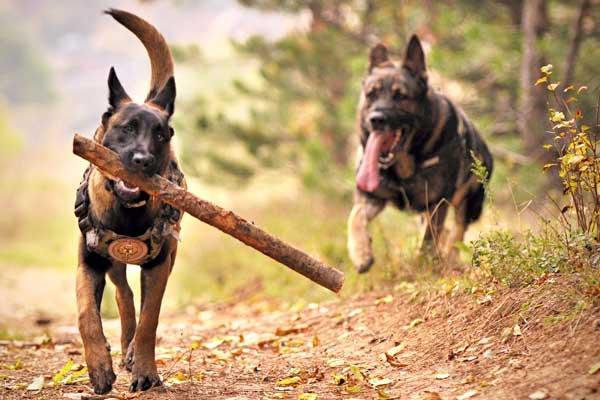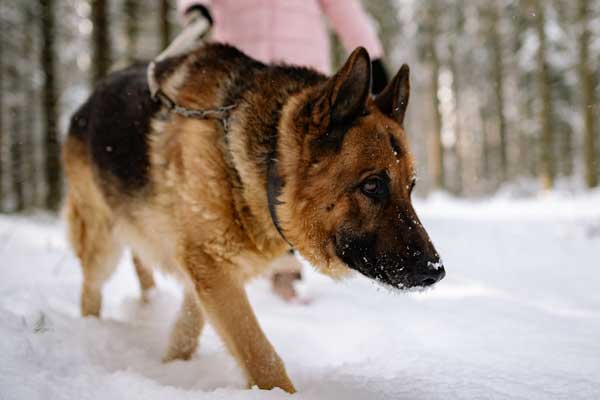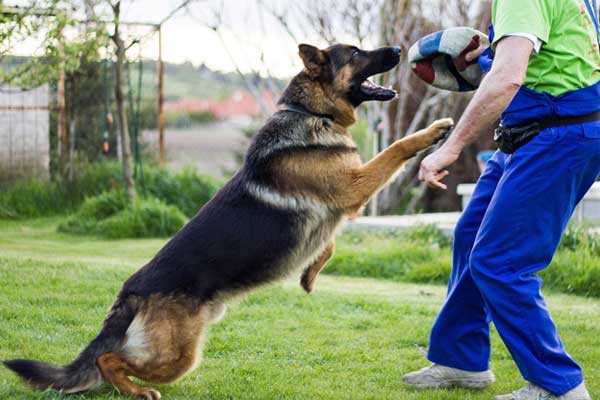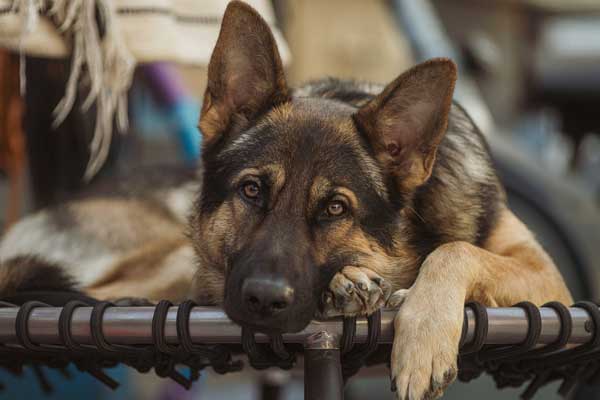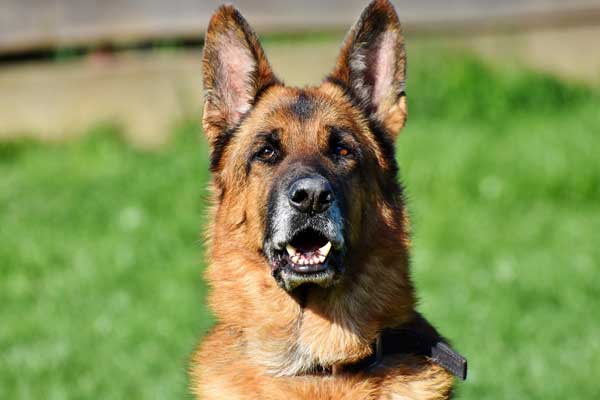Why Are German Shepherds Used as Police Dogs? A Dog of Many Talents
When you think of police dogs, German Shepherds are probably the first breed that comes to mind. But what makes them such perfect partners for law enforcement?
Well, it combines several factors—all of which make the German Shepherd an ideal candidate for police work.
Let’s examine why this breed is so popular with police officers and other law enforcement professionals.
Why Are German Shepherds Used as Police Dogs?
Highly Intelligent
A German Shepherd’s intelligence makes them perfect for responding quickly to commands and following instructions precisely.
This intelligence also helps them learn new commands quickly and retain more complex tasks over time. Their smarts make them ideal for the field, as they quickly adapt to different situations and environments.
Fast and Athletic Dogs
German Shepherds are fast and athletic dogs that can easily keep up with human handlers during pursuits or searches.
Their agility gives them an edge when navigating difficult terrain or tight spaces while on duty. They also have impressive stamina—essential when searching large areas or chasing suspects over long distances.
Powerful Dog Breed
German Shepherds may not be as large as other breeds, but they’re incredibly powerful animals.
This means they can quickly bring down even the most formidable opponents—making them invaluable assets in police work. Their strength makes them well-suited for crowd control or restraining dangerous suspects until help arrives.
Loyal Dogs
In addition to being intelligent and powerful animals, German Shepherds are also fiercely loyal creatures who will go to great lengths to protect their handlers from harm.
As a result, they make excellent partners for law enforcement personnel who often find themselves in dangerous situations and need an animal companion who can help protect them in such cases.
Strong Nose
German Shepherds also possess an incredibly keen sense of smell that allows them to track down suspects quickly and effectively during searches or investigations.
This keen sense of smell makes them invaluable tools in criminal investigations where evidence must be gathered before it is lost forever.
Extremely Obedient
German Shepherds are instinctive to obey orders, making them perfect for police work. They respond well to commands, need minimal training, and can be trusted in potentially dangerous or unpredictable situations.
This obedience also means they can be trained to find drugs or explosives quickly and accurately. Their alertness makes it easy for officers to monitor their surroundings while their canine partner sniffs out suspects or evidence.
He Can Work For Hours Without Getting Tired
Last but not least, the German Shepherd’s endurance is another factor that makes him an ideal candidate for police work—as he can work tirelessly without getting tired too quickly!
This means he can keep going strong even when his human counterparts need a break—making him an invaluable asset on any team!
Adaptable Working Dog
German Shepherds love being active, which makes them prime candidates for police work. Their endurance allows them to stay focused on a task without getting tired or distracted—essential when tracking down suspects or searching for evidence in large areas like woods or fields. Additionally, their strength gives them the power to tackle criminals if necessary.
The German Shepherd’s Rise to Fame as a Police Dog
German Shepherds are renowned for their intelligence and dedication, so they have become the go-to breed for police work. But where did it all begin? Let’s look back and discover how this heroic dog became a treasured member of law enforcement.
Origin of the Breed
The story of the German Shepherd begins with Max Von Stephanitz, who in 1899 founded the Verein für Deutsche Schäferhunde (Society for the German Shepherd Dog). His vision was to create an ideal working dog that could be used for multiple purposes.
He believed dogs should be bred primarily for function rather than form, so he developed his breed by crossing different types of herding dogs from Germany. After several iterations, he created what we now know as the modern German Shepherd.
Early Adoption by Police Departments
In 1910, Germany’s first police dog training school opened its doors in Berlin and began training police dogs using Von Stephanitz’s breed standard.
The characteristics of intelligence and loyalty that Von Stephanitz had bred into the German Shepherd made it an attractive choice for a variety of tasks, including police work.
The school quickly gained popularity across Europe and eventually spread to Canada and America, where various police departments have embraced it since 1915.
Advancements in Training Techniques
Scientific advances in canine psychology have led to more sophisticated training techniques, enabling trainers to utilize more subtle methods, such as verbal commands, instead of physical corrections.
This has resulted in more practical obedience and behavior modification skills among police dogs, leading them to become reliable partners on patrol or while performing search-and-rescue missions.
This also means that if a handler wants their K9 partner to do something specific, they can usually rely on them to do so without any issues or complications.
Can a Female German Shepherd Be a Police Dog?
When you think of police dogs, you probably picture the iconic German Shepherd. But can a female German Shepherd be a police dog? To answer that question, it’s essential to understand the qualities and traits necessary for successful police dogs. Let’s take a look at how female German Shepherds measure up.
The Qualities of an Ideal Police Dog
Police K9s have particular requirements for their job. They need to be obedient, alert, brave, and intelligent.
They also need to be able to work long hours in all kinds of weather conditions and demonstrate reasonable control over their instincts, such as hunger and fear.
Lastly, they must be strong enough to handle suspects without injuring them or being injured themselves.
Why Female German Shepherds Make Good Police Dogs
Female German Shepherds are just as capable as their male counterparts regarding being police dogs. The sex of the animal has no bearing on its ability to do the job; instead, it is more important that the dog has been trained correctly and is physically fit enough for the role.
Female German Shepherds are highly intelligent and have great stamina, making them well-suited for this type of work.
Additionally, female dogs tend to show more empathy than males, which can be helpful when people may require additional support or comfort from a canine companion.
It is worth noting that some countries prefer male K9s due to their larger size and strength, but female dogs can still excel in this role!
Many law enforcement agencies around the world have had success with using female K9s in their operations, and there are even some dedicated K9 units that only employ females!
How to Adopt a Retired Police Dog
If you’ve ever watched a police drama on TV, you probably know how excellent German Shepherds are. But did you know that you can adopt retired police dogs?
It’s true! So if you’re looking for a loyal companion and don’t mind the occasional spooky stare, a retired police dog could be your pup. Here’s what you need to know about adopting a retired K9.
What is a Retired K9?
A retired K9 is simply a working dog that has completed its duties in law enforcement or the military and has been released from service.
These dogs are usually between 8 and 10 years old when they retire, and they typically come from breeds like German Shepherds, Belgian Malinois, Bloodhounds, Labrador Retrievers, and Dutch Shepherds.
Where Can I Find a Retired K9?
The best place to start your search is with your local law enforcement agency or military branch. Most of these organizations have programs to help retired K9s find good homes after finishing their careers as working dogs.
You can also contact animal shelters or search online for rescue organizations specializing in placing retired K9s with adopters.
What Do I Need to Know Before Adopting?
It’s important to remember that these animals are used to leading an active lifestyle, so they will require plenty of exercise and stimulation to stay happy and healthy after retirement.
Additionally, some may experience anxiety or even aggression due to their past experiences as working dogs. So it’s essential to ensure that any potential adopter is prepared for this possibility before taking on the responsibility of caring for one of these pups.
Finally, most retired K9s will need specialized veterinary care due to injuries or illnesses incurred during their service—so potential adopters need to consider their ability (and financial means) to provide such care before committing to adoption.
The Price of a Police K-9 Unit German Shepherd
Have you ever wondered how much it costs to join the police force? If you want to add a four-legged friend to your family, the answer may surprise you.
Police German Shepherds are highly trained law enforcement dogs that cost as much as $50,000! In this blog post, we’ll explore why these furry friends are so expensive and what you can expect when adding one of these loyal companions to your home.
Why Are They So Expensive?
Police German Shepherds are bred for their intelligence, loyalty, and strength. They undergo years of rigorous training to become certified members of law enforcement and have an unmatched ability to detect explosives, narcotics, and other contraband.
They also possess superior tracking abilities that make them invaluable in search-and-rescue missions. All of these factors contribute to their high price tag—which can range from $10,000-$50,000 depending on the dog’s age and level of training.
What Can You Expect?
When adding a police K-9 unit German Shepherd to your family, expect lots of love and loyalty. These furry friends make great family pets since they are highly trainable and eager to please their owners.
They will bond closely with their owners and enjoy playing fetch or long walks with them. They also require a lot of mental stimulation, so be prepared for many playtimes! And don’t forget that they need plenty of exercise too—these dogs were bred for work, after all!
The Qualities of a Good Police Dog
A police dog is an invaluable partner to law enforcement agents. They are intelligent, brave, and loyal companions who often put their lives on the line to protect and serve human communities from danger. So what makes a good police dog? Let’s look at some qualities that make these furry heroes so effective.
Intelligence
Good police dogs have both innate intelligence and obedience training. They can recognize commands and respond quickly in situations of danger or uncertainty.
Many police dogs also possess an uncanny ability to sniff out drugs, explosives, or other evidence. This trait is beneficial when pursuing suspects or tracking lost persons in remote areas.
Boldness
It takes physical and mental courage to be a good police dog. The most successful ones have the boldness to confront criminals or potential threats head-on, even when facing danger themselves.
This quality is essential for the job; it allows them to stand their ground no matter what situation they find themselves in.
Loyalty
Good police dogs are fiercely loyal to their handlers and will do whatever it takes to protect them from harm’s way.
Their loyalty extends beyond their handler; many of these furry heroes will risk their lives for strangers to keep people safe from harm.
In addition, they can be trained to detect certain emotions, such as fear or stress, which helps them better understand how people around them feel in times of crisis.
The Most Popular Dog Breeds in Police Force
Law enforcement isn’t just for humans. Many departments across the country have four-legged officers working alongside their two-legged counterparts.
But what breeds are most popular among police forces? Let’s look at some of the top dogs in law enforcement!
German Shepherd Dogs
It’s no surprise that German Shepherds are one of the most popular police dogs breeds around. These alert, confident pooches make ideal officers, as they’re courageous, brilliant, and have a strong sense of loyalty.
Their keen sense of smell and hearing makes them great trackers and protectors. German Shepherds were used extensively during WWI to carry messages between officers on the front lines!
Belgian Malinois
These hardworking canines are quickly becoming a go-to for many police forces. They’re incredibly agile, obedient, and attentive to commands—all qualities that make them an ideal candidates for law enforcement work.
Belgian Malinois are highly trainable due to their intelligence and eagerness to please. That means they learn commands quickly and retain them easily—so you often see these pups participating in search-and-rescue operations or helping with drug busts!
Labrador Retrievers
Labrador Retrievers might have been bred as hunting dogs decades ago, but nowadays, they’re used predominantly as service animals—including by police forces worldwide!
Labs possess excellent senses of smell and hearing, which makes them great at finding illegal substances or tracking down fugitives.
Not only that, but these lovable dogs are incredibly loyal and obedient, too—qualities that make them perfect partners for their human counterparts in law enforcement.
Conclusion
It’s no wonder German Shepherds are so often used as police dogs—they possess all the traits necessary to excel at the job!
From their intelligence and obedience to their adaptability and strength, there is no doubt that these four-legged heroes are invaluable partners in law enforcement worldwide.
If you’re looking for a pup of your own, consider opting for a German Shepherd—make sure you’re prepared with plenty of patience and training tips!



